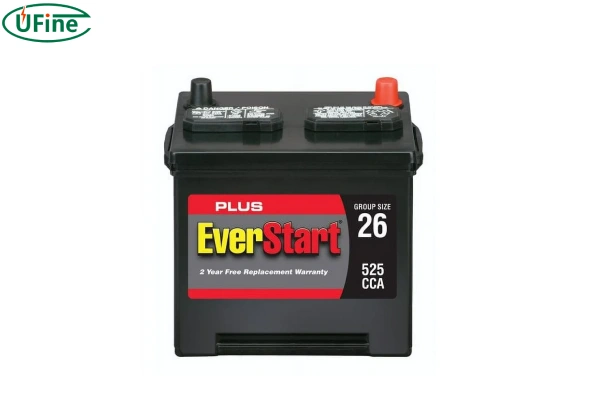Choosing the right battery is crucial for the optimal performance of your vehicle or equipment. Among the many options available, the Group 26 battery stands out for its versatility and reliability. This comprehensive guide will delve into everything you need to know about Group 26 batteries, from their dimensions and types to their prices and maintenance tips. Let’s get started!
Part 1. Battery group size meaning
Before we discuss the specifics of Group 26 batteries, it’s important to understand what battery group size means. Battery group size is a standardized system used by the Battery Council International (BCI) to categorize batteries based on their physical dimensions, terminal locations, and type. This standardization helps ensure compatibility across various vehicles and equipment. For example, a Group 26 battery fits into a specific category defined by its size and terminal position, ensuring it will fit and function correctly incompatible devices.
Part 2. What is the group 26 battery?

A Group 26 battery is a specific type of battery categorized by its dimensions and specifications. These batteries are commonly used in a variety of applications, including cars, trucks, and other equipment. Known for their compact size and reliable performance, Group 26 batteries are a popular choice for many vehicle owners. They are designed to deliver consistent power and are suitable for starting engines and providing power to various electrical systems in vehicles.
Part 3. Group 26 battery dimensions
One of the defining characteristics of a Group 26 battery is its size. The typical dimensions of a Group 26 battery are approximately 8.19 inches in length, 6.81 inches in width, and 7.76 inches in height. These dimensions make it a compact and versatile option that can fit into a variety of spaces. Ensuring that the battery fits properly in the allocated space is crucial for both safety and performance. Always measure the battery compartment in your vehicle or equipment to confirm compatibility.
Part 4. Group 26 battery types
There are several types of Group 26 batteries available on the market, each with its own set of features and benefits. The most common types include:
- Lead-Acid Batteries: These are the traditional and most widely used type of batteries. They are affordable and provide reliable performance but require regular maintenance.
- AGM (Absorbent Glass Mat) Batteries: These are a type of lead-acid battery but are designed to be maintenance-free. They offer better performance and longer lifespan compared to traditional lead-acid batteries.
- Lithium-Ion Batteries: These batteries are known for their high energy density, lightweight, and long lifespan. They are more expensive but provide superior performance and require minimal maintenance.
Choosing the right type of Group 26 battery depends on your specific needs and budget. For example, if you want a low-maintenance option, an AGM battery might be the best choice. If you’re looking for the latest technology with superior performance, a lithium-ion battery could be worth the investment.
Part 5. Group 26 battery price
The price of a Group 26 battery can vary based on the type and brand. On average, you can expect to pay between $50 to $150 for a standard lead-acid Group 26 battery. AGM batteries are typically priced higher, ranging from $100 to $200, due to their maintenance-free design and longer lifespan. Lithium-ion batteries are the most expensive, with prices ranging from $200 to $400 or more. It’s important to consider not only the initial cost but also the long-term value and performance when choosing a battery.
Part 6. Which type of group 26 battery is the best?
Determining the best type of Group 26 battery depends on several factors, including your specific needs, budget, and the intended use of the battery. Here’s a quick comparison to help you decide:
- Lead-Acid Batteries: Best for those on a tight budget and who don’t mind regular maintenance. They are reliable and cost-effective.
- AGM Batteries: Ideal for those looking for a maintenance-free option with better performance and a longer lifespan. They are a bit more expensive but offer good value.
- Lithium-Ion Batteries: Perfect for those who want the best performance, longest lifespan, and minimal maintenance. They are the most expensive but offer superior benefits.
Ultimately, the best type of Group 26 battery is the one that meets your specific requirements and offers the best balance of cost and performance.
Part 7. Where to Buy Group 26 Battery?
You can purchase Group 26 batteries from various places, including:
- Auto Parts Stores: Local auto parts stores like AutoZone, O’Reilly Auto Parts, and Advance Auto Parts usually carry Group 26 batteries.
- Online Retailers: Websites like Amazon, eBay, and Battery Mart offer a wide selection of Group 26 batteries with the convenience of home delivery.
- Big Box Stores: Retailers like Walmart, Costco, and Sam’s Club often have competitive prices on car batteries, including Group 26.
- Specialty Battery Stores: Stores that specialize in batteries, such as Batteries Plus Bulbs, provide expert advice and a wide range of options.
When buying a Group 26 battery, make sure to compare prices, check customer reviews, and consider warranty options to get the best deal.
Part 8. Group 26 battery maintenance
Proper maintenance can significantly extend the life of your Group 26 battery. Here are some tips to keep your battery in top condition:
- Regularly Check the Battery Terminals: Ensure that the terminals are clean and free of corrosion. Use a mixture of baking soda and water to clean any buildup.
- Keep the Battery Charged: Avoid letting the battery discharge completely. Regularly check the voltage and charge it as needed.
- Store Properly: If you’re not using the battery for an extended period, store it in a cool, dry place. Avoid exposing it to extreme temperatures.
- Inspect for Damage: Regularly inspect the battery for any signs of damage or leaks. Replace the battery if you notice any issues.
- Follow Manufacturer’s Instructions: Always follow the manufacturer’s guidelines for maintenance and usage to ensure optimal performance.
By following these maintenance tips, you can ensure that your Group 26 battery remains reliable and performs well for a longer period.
Part 9. Conclusion
Understanding the ins and outs of Group 26 batteries can help you make an informed decision when choosing the right battery for your needs. From their dimensions and types to their prices and maintenance tips, we’ve covered everything you need to know.
Whether you’re looking for a budget-friendly lead-acid battery or a high-performance lithium-ion option, there’s a Group 26 battery that fits your requirements. Remember to consider your specific needs, compare options, and follow proper maintenance practices to get the most out of your battery.
Related Tags:
More Articles

Standard 24 Group Battery Dimensions Explained
What is 24 Group battery standard dimension? Find out now and choose the right battery for your needs. Don’t wait—get informed!
How Cobalt Free Batteries Are Transforming the Electric Vehicle Market?
Cobalt-free batteries are transforming the electric vehicle market with a sustainable choice. This article explores their benefits, challenges, and potential.
Lithium Manganese Batteries: A Comprehensive Guide
Lithium manganese batteries are transforming energy storage. This guide covers their mechanisms, advantages, applications, and limitations.
12 Volt 100Ah Lithium Battery: 12 Important Facts
Want to know about 12 Volt 100Ah lithium batteries? Explore essential facts that reveal their advantages and uses. Get informed today!
Why Choose a UPS Lithium Battery for Your Power Backup Needs?
Choosing the right battery for UPS systems is vital. UPS lithium batteries offer superior performance and longevity, making them perfect for power backup needs.




